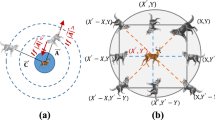Abstract
There are defects such as the low convergence rate and premature phenomenon on the performance of simple genetic algorithms (SGA) as the values of crossover probability (P c) and mutation probability (P m) are fixed. To solve the problems, the fuzzy control method and the genetic algorithms were systematically integrated to create a kind of improved fuzzy adaptive genetic algorithm (FAGA) based on the auto-regulating fuzzy rules (ARFR-FAGA). By using the fuzzy control method, the values of P c and P m were adjusted according to the evolutional process, and the fuzzy rules were optimized by another genetic algorithm. Experimental results in solving the function optimization problems demonstrate that the convergence rate and solution quality of ARFR-FAGA exceed those of SGA, AGA and fuzzy adaptive genetic algorithm based on expertise (EFAGA) obviously in the global search.
Similar content being viewed by others
References
CHEN Guo-liang, WANG Xu-fa, ZHUANG Zhen-quan. Genetic algorithms and applications [M]. Beijing: Posts and Telecom Press, 1999. (in Chinese)
FANG Lei, ZHANG Huan-chun, JIANG Ya-zhi. A new fuzzy adaptive genetic algorithm [J]. Journal of Electronic Science and Technology of China, 2005, 3(1): 57–59, 71.
LI Shu-gang, WU Zhi-ming, PANG Xiao-hong. A fuzzy rule based genetic algorithm and its application in FMS [J]. High Technology Letters, 2005, 11(1): 56–60.
VASCONCELOS J A, RAMREZ J A, TAKAHASHI R H C, SAIDANHA R R. Improvements in genetic algorithms [J]. IEEE Transactions on Magnetics, 2001, 37(5): 3414–3417.
LUO Jian-xu, SHAO Hui-he. A neurofuzzy system based on rough set theory and genetic algorithm [J]. Journal of Harbin Institute of Technology: New Series, 2005, 12(3): 278–282.
WANG Xin, YANG Chun-hua, QIN Bin, GUI Wei-hua. Parameter selection of support vector regression based on hybrid optimization algorithm and its application [J]. Journal of Control Theory and Applications, 2005, 3(4): 371–376.
SRINVIVAS M, PATNIK L M. Adaptive probabilities of crossover and mutation in genetic algorithms [J]. IEEE Transactions on Systems, Man and Cybernetics, 1994, 24(4): 656–667.
XI Ping-yuan, WANG Bing, SHENTU Liu-fang, HU Heng-yin. Fuzzy optimization of an elevator mechanism applying the genetic algorithm and neural networks [J]. International Journal of Plant Engineering and Management, 2005, 10(10): 236–240.
TONG Xiao-hua, WU Song-chun, WU Su-qing, LIU Da-jie. A novel vehicle navigation map matching algorithm based on fuzzy logic and its application [J]. Journal of Central South University of Technology, 2005, 12(2): 214–219.
LIU Bo, WANG Yong, WANG Hong-jian. Using genetic algorithm based fuzzy adaptive resonance theory for clustering analysis [J]. Journal of Harbin Engineering University, 2006, 27(S): 547–551.
PARMOD K, CHANDNA V K, THOMAS M S. Fuzzy-genetic algorithm for pre-processing data at the RTU [J]. IEEE Transactions on Power Systems, 2004, 19(2): 718–723.
WANG Ke-jun. A new fuzzy genetic algorithm based on population diversity [C]// Proceedings of 2001 IEEE International Symposium on Computational Intelligence in Robotics and Automation. Banff, Alberta, Canada, 2001: 108–112.
LI Fa-chao, SU Lian-qing, RAN Hai-chao. The fuzzy genetic algorithm based on rule [C]// Proceeding of Fourth International Conference on Machine Learning and Cybernetics. Guangzhou, 2005: 2454–2459.
LIU Xi-chun, YU Shou-yi. A genetic algorithm with fast local adjustment [J]. Chinese Journal of Computers, 2006, 29(1): 100–105. (in Chinese)
GUO Guan-qi. Analysis and suppressing methods of genetic drift in evolutionary computation [D]. Changsha: School of Information Science and Engineering, Central South University, 2003: 93–95. (in Chinese)
LI Ming. The study on improved genetic algorithm and its application in optimization questions [D]. Changchun: School of Mathematics, Jilin University, 2004: 17. (in Chinese)
Author information
Authors and Affiliations
Corresponding author
Additional information
Foundation item: Project(60574030) supported by the National Natural Science Foundation of China; Key Project(60634020) supported by the National Natural Science Foundation of China
Rights and permissions
About this article
Cite this article
Yu, Sy., Kuang, Sq. Fuzzy adaptive genetic algorithm based on auto-regulating fuzzy rules. J. Cent. South Univ. Technol. 17, 123–128 (2010). https://doi.org/10.1007/s11771-010-0020-8
Received:
Accepted:
Published:
Issue Date:
DOI: https://doi.org/10.1007/s11771-010-0020-8




